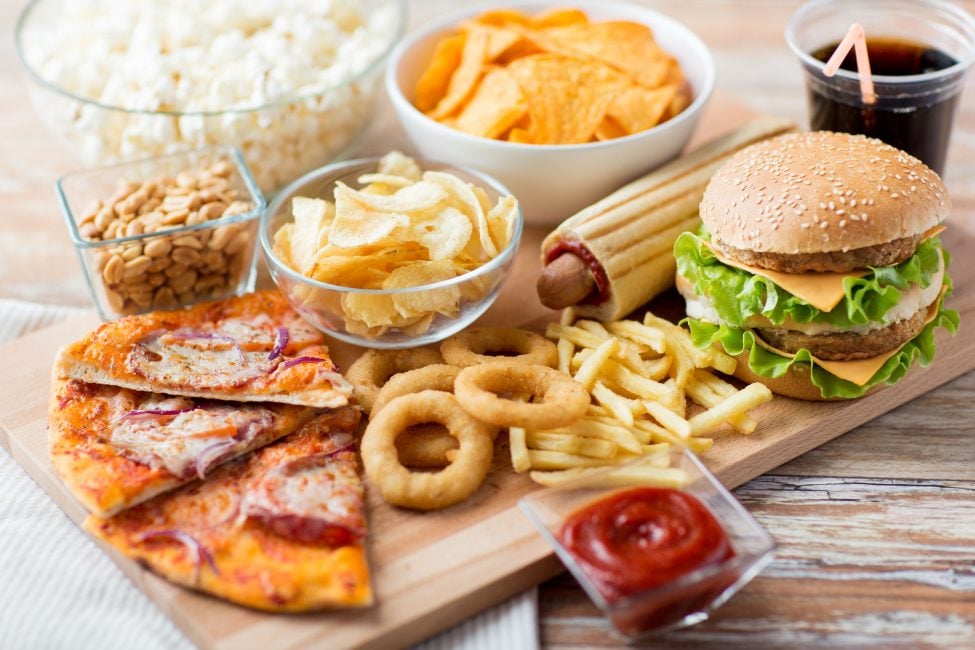
No matter your age, acne can flare up when you least expect and be the cause of much embarrassment. Despite many years of debate, recent studies prove that what you eat can play a significant role in the health and appearance of your skin with certain foods that can increase the frequency of your acne breakouts by as much as 10%. It is important to be aware of some of the primary acne-causing foods that are best to avoid!
MILK

Dairy products, specifically milk, are thought to contribute to the severity of your acne symptoms due to the bovine hormones that remain bioavailable with ingestion. Moreover, skim milk is a worst alternative than whole milk because the milk proteins that are added to skim milk to make it taste less watery, such as whey and casein, have been tied to causing further inflammation. That's why bodybuilders that use whey protein drinks as a workout supplement suffer acne on their body. Milk may be hard to cut out entirely as it’s in a significant amount of the foods we eat daily, however cutting down is a great start! There are many alternatives available in most supermarkets, such as almond or even oat milk.
CHOCOLATE

Chocolate has long had a nasty rap as the leading cause for all our unsightly blemishes. However, the great news for all the chocolate lovers out there's that cacao in its raw form has been proven to possess no impact on your acne breakouts. In fact, raw cacao is full of vitamins A, C, E and zinc which are all highly beneficial for your skin. It’s actually the dairy and sugar often mixed in with most candy bars and desserts that have linked chocolate to a severe case of acne. So next time try choosing high percentage dark chocolate or snackable cacao nibs as a treat. Avoid milk or chocolate which are mostly made from all the ingredients which will cause inflammation and agitate your acne.
SUGAR

From study, sugar and foods high on the glycemic index are a serious contributor to your acne breakouts. Essentially, foods with high sugar content will cause your body’s insulin levels to spike. This extreme overdose of insulin increases the assembly of oils within the skin, which cause your follicles and pores clogging up with sebum. Alongside the inflammatory effects that are caused by a spike in insulin, this creates the perfect environment for P. Acnes bacteria to thrive, triggering a nasty breakout. If you can’t say goodbye to dessert, the simplest workaround is to cut down the number of high sugar foods. A couple of bites are all you would like to sate your inkling for something sweet after dinner, and you’ll avoid that dreaded insulin spike.
FAST FOOD

Fast food is the culprit for a growing number of health concerns, and for all an equivalent reasons stated above, fast food should be on the off-limits list for your skin too. The high saturated fats and processed ingredients inside fast food can completely throw off your hormonal balance and blood glucose levels. If you have a craving for fast food, try making your own version at home. Swap baked for fried potatoes and choose white meat instead of red in your burger.
ALCOHOL
Although alcohol has not been proven to impact our acne directly but once we drink, it always creates an imbalance in estrogen or testosterone levels, which are a major cause of the frequency and severity of breakouts. When hormone levels are increased, our skin produces a substance called sebum which clogs our pores with oil and bacteria, eventually causing painful breakouts. Binge drinking also can wreak havoc on our immune systems which usually help fight off any bacteria causing acne also as other common viruses. In fact you ought to always drink moderation, except for those that are more susceptible to breakouts than others, keep drinking to a minimum.
It’s important to remember that food isn’t the enemy; it can actually be the solution when you eat the right foods! Incorporating foods that fight acne into your diet, like flax seeds or fish oils, can have an anti-inflammatory and protective effect. A healthy meal plan that includes lots of whole grains, green vegetables and plenty of water can make a real difference in your skin. We are all made from a unique combination of chemicals and hormones, so it’s always propriety to keep track of what you’re eating and the way it affects your body.





